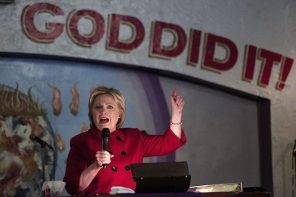I guess there is more to say on the subject of Democratic religious outreach, since Sarah and I seem to be ping-ponging back and forth about it.
Sarah makes the substantive point that Democratic work with religious groups may be guided more by a desire to get votes on crucial issues than any kind of coherent plan. She cites Chuck Schumer talking to conservative evangelical leaders on immigration.
I think that’s quite right. It’s also the case, however, that the party’s organized outreach outreach is and has been driven by a certain amount of conventional wisdom. For one thing, many of the Washington insiders who have been responsible for putting together the religious outreach program or advocating for it are themselves moderate-to-liberal evangelicals. For example Josh Dubois, who headed the program during the 2008 campaign, is a Pentecostal minister. And much of the religious outreach strategy that originated in Jim Clyburn’s office (that’s where Burns Strider, among others, got his start) had a focus on swing evangelicals.
That’s not to blame anyone for being an evangelical. Another way of putting my point is simply that politics is made up of specific people, who carry specific perspectives and assumptions into their work. I might read the polls another way, but then I have my own perspectives and assumptions. Shrug.
It also may very well be that the party has made the prudential calculation that they can bring in more evangelical votes than mainliners or Catholics. Again, I think that’s wrong, though the thinking is understandable.
But by now whether or not religious outreach is effective is something of a moot point. The party has disassembled its apparatus. Maybe it will come back, maybe it won’t. From my perspective, the interesting thing about it now is that the concept of religious outreach defined as “getting evangelicals to vote Democratic” seems to be one of those things that gets into the D.C. water supply. No matter how many times you point out that it may not live up to its promises, nobody changes their opinion on the subject.
That may say something about how the Village sees “real Americans,” or as I say, it may have more to do with what it takes to keep people’s careers afloat. How you untangle those two, I do not know.



